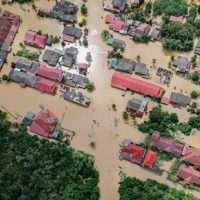Ivey/ARCS PhD Sustainability Academy award winners share tips for thriving as an emerging scholar.
The journey to getting a PhD is nothing short of transformative. You are stretched along many dimensions, all at once. You’re learning to manage time, projects, and stakeholders. Understanding new theories and research methods stretches you intellectually. You morph your personal identity, as you start viewing and trusting yourself as a scholar.
If you’re studying sustainability, you probably also fret about real-world impact. How can you publish in good journals and be relevant to practice?
The good news? You are not alone in navigating these experiences.
PhD Sustainability Academy
The PhD Sustainability Academy, co-hosted by the Ivey Business School and Alliance for Research on Corporate Sustainability (ARCS), brings together PhD students and senior researchers, spanning multiple disciplines and theoretical and methodological approaches. Each student receives intensive feedback on their research project, but also becomes part of a highly supportive community of impact-oriented scholars.
Applications for the 2025 PhD Sustainability Academy (November 20-23) are open until September 30, 2025.
Advice for New Doctoral Students
Can’t attend the Academy? That’s OK. The 2024 award winners are bringing a piece of the community to you, by sharing their top advice for doctoral students.
The 2024 NBS Best Paper Award Winners are:
-
Lisa Keding, doctoral student at RWTH Aachen University.
-
Natalia Lyly, doctoral researcher at LUT Business School
The 2024 Impact Scholar Community Award Winners are:
-
Niki Khorasani, now an Assistant Professor at the Asper School of Business, University of Manitoba
-
Âriel de Fauconberg, Assistant Professor of Management, Innovation, and Entrepreneurship at NC State’s Poole College of Management
Below, Lisa, Natalia, and Niki offer heartfelt tips for navigating your PhD. Interestingly, each independently identified the importance of community. Thriving in your PhD requires surrounding yourself with experts and peers, from both within your university and beyond, who can celebrate your victories, empathize with your challenges, offer advice, and push your thinking. In addition to identifying the importance of community, each person also shared unique wisdom from their own, lived experience.
Lisa’s Advice: Study What Excites You
My top advice is to choose a research topic that genuinely excites you and aligns closely with your personal motivation. You will spend several years deeply engaged with this topic, so your passion and curiosity will sustain you throughout the process.
Secondly, take the necessary time at the outset to carefully identify your research topic and build a rich data source that can support multiple studies.
Lastly, actively engage with colleagues and experts, both within and beyond your university. Most people are approachable, generous with their advice, and willing to support your academic journey. Being proactive about talking to people can open new ideas, collaborations, and opportunities.
Read about Lisa’s research here:
-
|
September 21, 2025
Lisa Keding received the Best Paper Award at the 2024 Ivey/ARCS PhD Sustainability Academy. Learn about her research and personal motivations.
Natalia’s Advice: Take Time to Recharge
To anyone starting this journey, my first piece of advice is to build a support network early on and surround yourself with both peers and mentors who understand what you’re going through. Doing a PhD is a lot of work. It can be lonely, and it always involves both ups and downs. Sharing the experience with others makes the process less daunting, provides perspective, and allows you to celebrate achievements and manage setbacks with others.
Second, it’s good to remember that pursuing a PhD is more like running a marathon than a sprint. There will be moments when progress feels slow or the workload overwhelming. In those times, be kind to yourself and allow space for rest and reflection. It’s important to have interests and hobbies outside the PhD to help you recharge and take your mind off things.
For me, it has also been important to remind myself of the reasons why I started this journey. Returning to those initial motivations has been a source of resilience, helping me stay focused.
Read about Natalia’s research here:
-
|
September 21, 2025
Natalia Lyly received the NBS Best Paper Award at the 2024 Ivey ARCS PhD Sustainability Academy. Learn about her research and personal motivations.
Niki’s Advice: Consider Overlooked Possibilities
Sustainable business research often contains deep contradictions. It is a field filled with ambitious claims, vague terminology, and persistent tensions between stated intentions and actual outcomes. It is not necessary to resolve these contradictions immediately. Instead, it may be more fruitful to identify one question or tension that resonates on a personal and intellectual level, and to pursue it with focus and care.
This kind of research also involves attending to what is emerging but not yet fully visible. Some of the most meaningful insights may come from observing subtle experiments and fragile shifts in how people think, organize, or relate to the future. These may not align with dominant narratives, but they can illuminate overlooked possibilities.
It is important to seek out intellectual community—whether through peers, scholars, or alternative literatures—that helps sustain critical inquiry over time. The academic process often demands clarity and speed, but future-oriented research requires comfort with uncertainty and the patience to stay with complexity. Give yourself the space to think carefully, and the confidence to pursue ideas that are not yet widely understood.
Read about Niki’s research here:
-
|
September 21, 2025
Niki Khorasani received the Impact Scholar Community Award at the 2024 Ivey/ARCS PhD Sustainability Academy. Learn about her research and personal motivations.
The post Award-Winning Doctoral Students Offer Advice for Navigating Your PhD appeared first on Network for Business Sustainability (NBS).

















